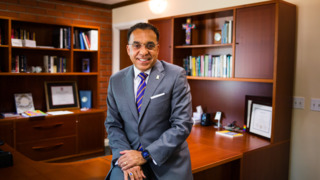***
Leading the Path Forward - Diversity in Education
Over the next two years, Dr. John A. Nunes is determined to strengthen the foundation of California Lutheran University and increase its ability to meet the needs of students from underserved populations.
Since his two-year appointment as interim president began on June 1, 2024, Nunes has immersed himself in the life of the university. He has over 40 years of experience in faith-based, nonprofit leadership, stating that his work as a college administrator is guided by his Lutheran faith. This work has included small, community-based urban development, international relief and development as well as a college presidency.
“This time in which we find ourselves in higher ed with the headwinds posing existential threats to small private liberal arts schools…I strive to lead with what I call empathetic decisiveness,” says Nunes in an interview with Diverse. “We have to make hard decisions, but it’s better to make hard decisions with care and compassion while you have a runway and resources, which this institution does have, before you’re faced with heartbreaking decisions with no other options available. We’re not in a precarious situation, but we are in one that requires action, adaptation and reimagination.” Dr. John A. Nunes
Dr. John A. Nunes
Although California Lutheran University identifies as nonsectarian, it is affiliated with the Evangelical Lutheran Church in America. Nunes has been an ordained Lutheran minister for more than 30 years and he earned his Ph.D. from the Lutheran School of Theology at Chicago.
“There is a Lutheran liberal arts tradition that places an emphasis on critical thinking, challenging assumptions and inclusion,” Nunes says. “I don’t defend everything that Martin Luther said or did, but clearly at the time of the Reformation (16th century) there was an emphasis that he had around access to education and access to literacy.”
Nunes notes that during the Lutheran Reformation there was a democratization of knowledge. Today, diversity is part of the strategic solution to make California Lutheran University thrive. It is a Hispanic Serving Institution (HSI) and has a minority-majority student body. Nunes is committed to helping the institution deepen its understanding and commitment to its HSI status and has the Excelencia in Education’s Seal of Excelencia as a goal within the school’s reach.
Moving forward, the word Lutheran is consequential to the university’s identity, Nunes says, but Martin Luther’s inclusive vision of education needs to be contextualized for today’s world.
“We work hard to create an environment in which all people are regarded as created in the image of God bearing dignity, value, worth, meaning and purpose,” Nunes says.
At California Lutheran University, there is and will continue to be the idea that every person matters. Nunes works hard to know the names of his students. He moves around the campus on an open golf cart, so he can greet people.
There is a unique opportunity, which Nunes hopes to deliver in terms of every student having a sense of belonging, that moves beyond a cultural event to seeing themselves in the classroom and seeing the university as their school. He has also created an emerging leader cohort program to identify and bring together mid-level faculty and staff for leadership development.
With a two-year term, Nunes knows that he is more than a placeholder for the presidency. It is possible that, at the end of two years, the interim designation will be removed from Nunes’ presidency. The board has been very clear about some of the objectives they have for him. Right now, he is focused on the present.
“The only way I’m thinking beyond two years is with respect to the longevity, viability and sustainability of the institution,” he explains. “For now, the interim term is one I appreciate because I’m kind of at the age and stage of life where I don’t know what’s next. I might want to just go play with my grandkids. I like writing and speaking. I love leading, but I like to do other things as well.”
Remaining faithful to what is right in front of him includes some imminent challenges. This involves facing the changing world of higher education, which requires creatively thinking of ways to reshape the university’s business model. Other points on the agenda are addressing campus culture and board development.
“Governance is something that we need to think about differently,” Nunes says. “This board has an appetite and aptitude to be adaptive and to remain relevant to our time.”
In addition to diversity, equity and inclusion, California Lutheran University has added justice and belonging. These tenets are being baked into every aspect of the school’s vision and values because it is entirely consequential to the student experience and to the business model.
At present, the university is in the midst of an academic program analysis. Part of that involves looking at what market trends are indicating. The university’s Center for Economic Research and Forecasting issues Latino and Latina GDP (gross domestic product) reports, which include deep analysis of trends for Latinx communities.
“We plan to have a data based, analysis based set of decisions that will continue to adjust our academic programming so that it meets the needs of this student population,” says Nunes.



















